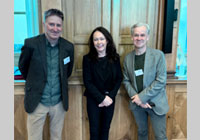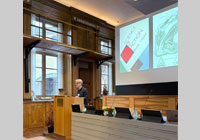


SCAS News - 17 December, 2024
Global Foresight Conference: A Look Back and Forward
Last week, the Global Foresight: Anticipatory Governance and Future Aspirations conference marked the
culmination of the Global Foresight research project with two days of inspiring discussions, thought-provoking
lectures, and fruitful exchanges at SCAS in Uppsala. While the conference served as a wrap-up for this signi-
ficant project, it also laid the groundwork for fresh ideas and future research directions.
The event began with a keynote lecture by Tor Hernes (Copenhagen Business School and USN Business
School). In his presentation, How to Reach for the Moon: Moving Towards Distant and Unknown Futures,”
Hernes challenged us to think beyond the short-term horizons that often dominate organizational strategies.
He explored how external forces such as climate change compel organizations to adopt longer temporal
perspectives, often spanning decades. His insights on navigating "gray zones" between present actions and
distant outcomes underscored the importance of balancing immediate decisions with long-term goals.
In the afternoon, Christina Garsten (Swedish Collegium for Advanced Study), Mikkel Flyverbom
(Copenhagen Business School), Ulrik Jennische (Stockholm University), and Adrienne Sörbom (Söder-
törn University), as well as Afshin Mehrpouya (Edinburgh University Business School) and Melissa
Fisher (New York University) presented insights from the project Global Foresight, funded by RJ. The
presentations focused on various ways in which anticipatory governance is constructed and negotiated
amongst organizational actors, and what the implications in terms of agency, authority, and power may
be.
On the second day, Anders Ekström (Uppsala University) delivered an equally engaging lecture, Places of
Temporalization: The Tarfala Experiment. He delved into the history of climate knowledge and the shifting
rhythms of Anthropocene temporalities, revealing how the past serves as a "living archive." Ekström high-
lighted the need for research that not only interprets historical patterns but also anticipates future develop-
ments,
offering profound reflections on the interplay between natural and historical time.
The panel discussion, “Elusive Futures: The Crafting of a World Ahead,” moderated by Christina Garsten,
was another highlight of the conference. Panelists Christiaan De Beukelaer, Valbona Muzaka, Elizabeth
Hull,
and Peter Haldén provided diverse perspectives on how futures are imagined and shaped. From
discussions about global material flows and sustainable practices to the challenges of agreeing on the past to
shape a common future, the panel emphasized the significance of multiple viewpoints. They also explored the
transformative power of collective belief in potential futures, reminding us that while we navigate differing
narratives, we share one interconnected future.
We are deeply grateful to Tor Hernes and Anders Ekström for their inspiring and thought-provoking lectures,
which set the stage for the meaningful discussions that followed. Their contributions challenged us to rethink the
intricate relationships between time, governance, and future possibilities.
A heartfelt thank you also goes to the research team for their hard work and collaboration in bringing the Global
Foresight project to this significant milestone. This event would not have been possible without their dedication.
Finally, we extend our thanks to all the participants who made this conference so dynamic. Your perspectives
and engagement created a vibrant environment for exchanging ideas and exploring new directions.
Although this conference served as the concluding event for the Global Foresight project, it is clear that the
insights and ideas generated here have sparked countless new questions and research opportunities. The
foundation laid during this event offers much to build upon in the years to come.






